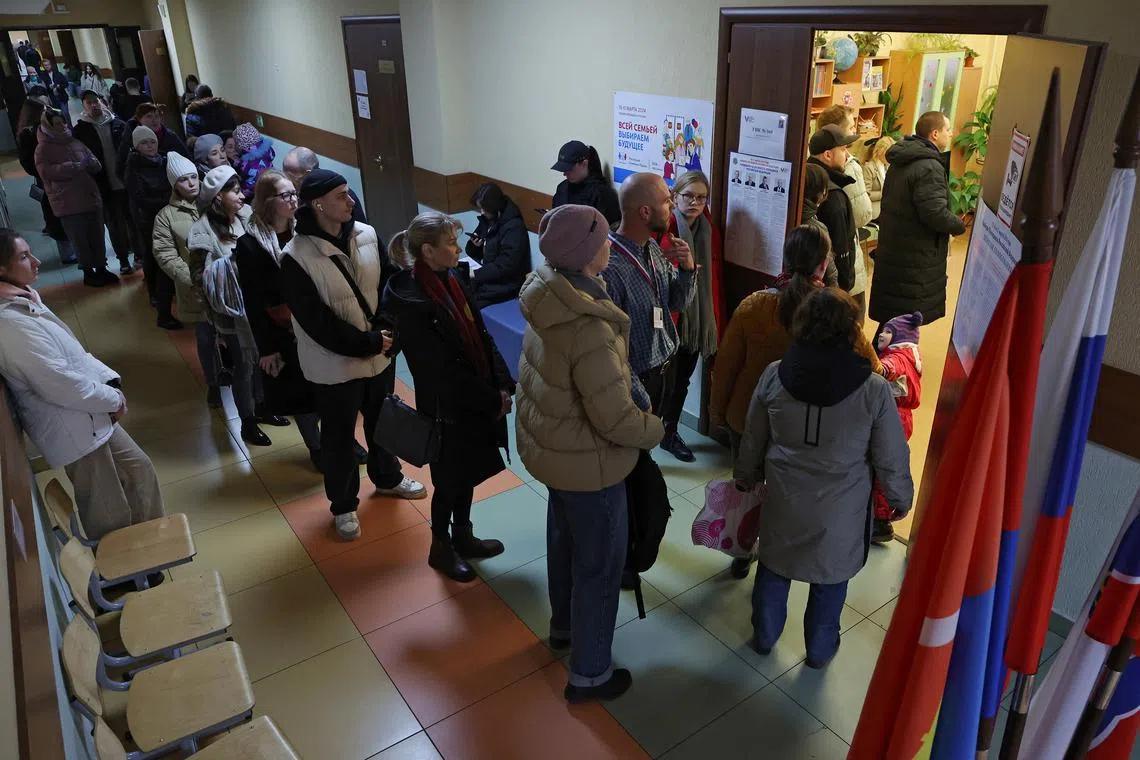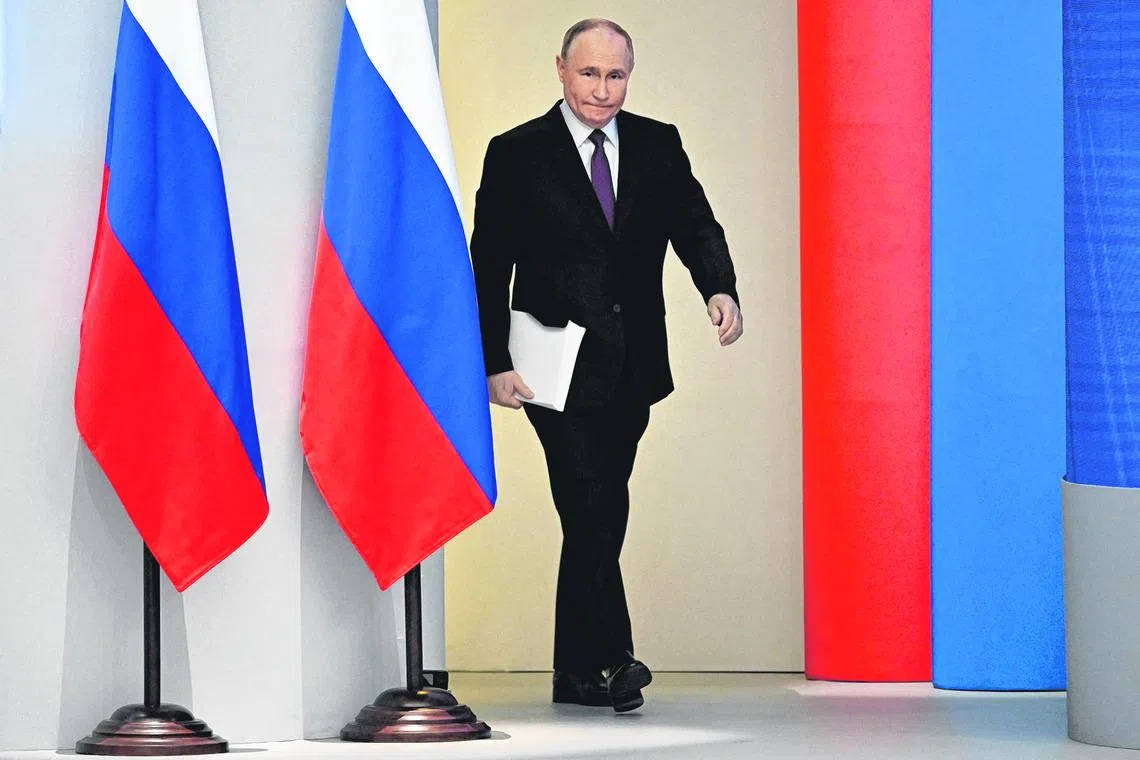Putin to tighten grip on Russia even as opponents stage election day challenge
Sign up now: Get ST's newsletters delivered to your inbox

Voters queue to enter a polling station around noon on the final day of the Russia's presidential election.
PHOTO: REUTERS
Follow topic:
MOSCOW – Russian President Vladimir Putin is poised to tighten his grip on power on March 17 in an election that is certain to deliver him a landslide victory, even as thousands of his opponents stage a symbolic protest against his rule at polling stations.
Mr Putin, who rose to power in 1999, is poised to win a new six-year term that, if he completes it, would make him Russia’s longest-serving leader in more than 200 years.
The election comes just over two years after Mr Putin triggered the deadliest European conflict since World War II by ordering the invasion of Ukraine
War has hung over the three-day election. Ukraine has repeatedly attacked oil refineries in Russia, shelled Russian regions and sought to pierce its borders with proxy forces, a move Mr Putin said would not be left unpunished.
While Mr Putin’s re-election is not in doubt, given his control over Russia and the absence of any real challengers, the former KGB spy wants to show that he has the overwhelming support of Russians. Several hours before polls were due to close, the nationwide turnout surpassed 2018 levels of 67.5 per cent.
Supporters of Mr Alexei Navalny, who died in unexplained circumstances at an Arctic prison in February, called on Russians to come out at a “Noon Against Putin” protest
There was no independent tally of how many of Russia’s 114 million voters took part in the opposition demonstrations, amid extremely tight security involving tens of thousands of police and security officials.
Reuters journalists saw an increase in the flow of voters, especially younger people, at noon at some polling stations in Moscow, St Petersburg and Yekaterinburg, with queues of several hundred people and even thousands.
Some said they were protesting, though there were few outward signs to distinguish them from ordinary voters.
When Mr Navalny’s widow, Yulia, appeared at the Russian Embassy in Berlin where Russians were waiting to vote, some cheered her and chanted, “Yulia! Yulia!”
Mr Navalny’s exiled supporters broadcast footage of protests inside Russia and abroad on YouTube.
“We showed ourselves, all of Russia and the whole world that Putin is not Russia, that Putin has seized power in Russia,” said Mr Ruslan Shaveddinov, of Mr Navalny’s Anti-Corruption Foundation. “Our victory is that we, the people, defeated fear. We defeated solitude. Many people saw they were not alone.”
Mr Leonid Volkov, an exiled Navalny aide who was attacked with a hammer last week in Vilnius, Lithuania, estimated that hundreds of thousands of people had come out to polling stations in Moscow, St Petersburg, Yekaterinburg and other cities.
Scattered incidents
At polling stations at Russian diplomatic missions from Australia and Japan to Armenia, Kazakhstan and Georgia, hundreds of Russians stood in line at noon.
Over the previous two days, there were scattered incidents of protests
But Mr Navalny’s death
The West variously casts Mr Putin as an autocrat, a war criminal and a killer.
Mr Putin casts the war as part of a centuries-old battle with a declining and decadent West that he says humiliated Russia after the Berlin Wall fell in 1989 by encroaching on what he considers to be Russia’s sphere of influence such as Ukraine.
Russia’s election comes at a crossroads for the Ukraine war and the wider West in what United States President Joe Biden casts as a broader 21st century struggle between democracies and autocracies.
Support for Ukraine is tangled in US domestic politics ahead of the November presidential election contest between Mr Biden and his predecessor, Donald Trump, whose Republican party in Congress has blocked military aid for Kyiv.
Though Kyiv recaptured territory after the invasion in 2022, Russian forces have lately made gains after a failed Ukrainian counteroffensive in 2023.
The Biden administration fears Mr Putin could grab a bigger slice of Ukraine unless Kyiv gets more support soon. US Central Intelligence Agency director William Burns has said that could embolden Chinese President Xi Jinping.
Mr Putin says the West is engaged in a hybrid war against Russia that will include trying to meddle in its election and cast doubt on its results.
What happens next
Dr Angela Stent, a senior non-resident fellow at the Brookings Institution, said the election outcome was not in question, but that there were serious reasons to take note of the event.

Mr Vladimir Putin is poised to win a new six-year term that, if he completes it, would make him Russia’s longest-serving leader in more than 200 years.
PHOTO: AFP
“Vladimir Putin will win, probably by a landslide, and he will claim increased legitimacy as a successful war leader on March 18,” Dr Stent told the Russia Matters project at Harvard Kennedy School’s Belfer Centre for Science and International Affairs.
“The Russian presidential election matters to the United States and its allies for two reasons: what happens during the voting period and what follows after it is over.”
Whoever wins the November US presidential election is almost certain to have to deal with an emboldened Mr Putin. REUTERS

